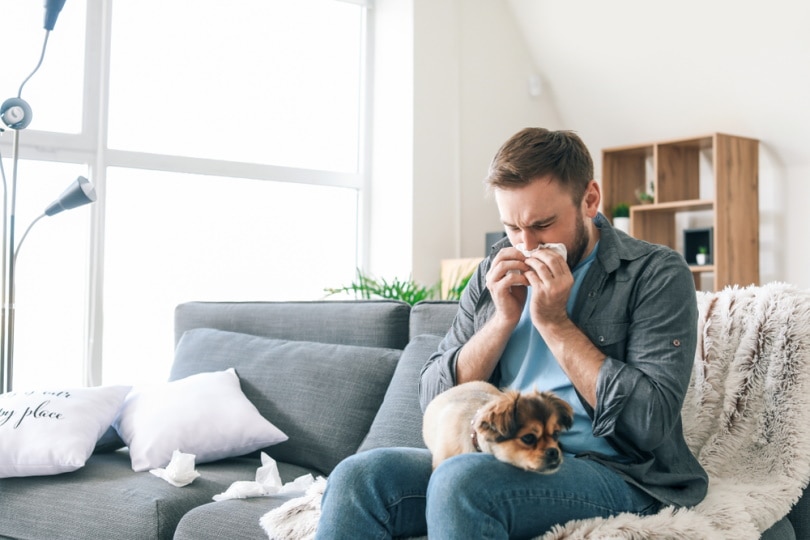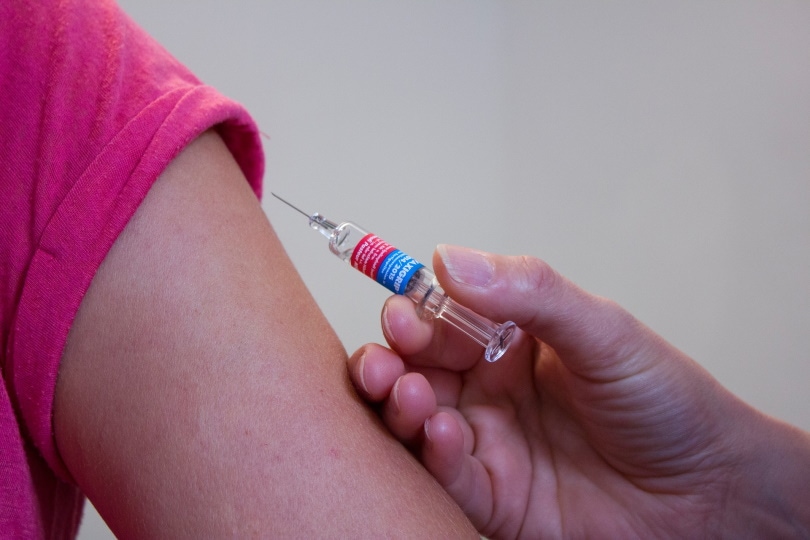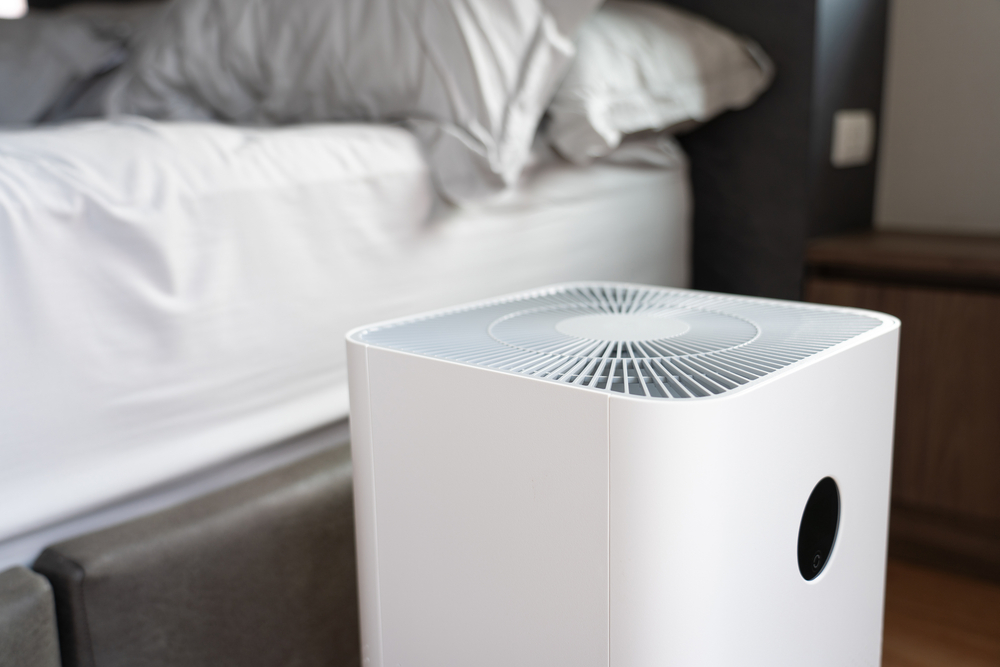Can I build immunity to dog allergies

Is It Possible to Build Up an Immunity to Dog Allergies? Facts & FAQ
Approximately 10 to 20 percent1 of humans worldwide suffer from dog or cat allergies. For animal lovers, an allergy to your favorite pet can be devastating. Allergies can be quite debilitating, but with the advancement of modern medicine, more and more can be done to combat those pesky allergies.
If you are a dog lover who suffers from a dog allergy2, you may wonder if there is anything you can do to build immunity to the allergy to make life with your dog that much more comfortable. The good news is that some things can be done to help you build immunity. There are also some other suggestions to help relieve the allergies. Lets take a look.

What Causes Dog Allergies?
Allergies are the reaction that takes place when the bodys immune system reacts to a form of allergen. With dog allergies, the reaction is typically due to certain proteins found mostly in oil secretions from a dogs skin and, more commonly, in the saliva.
It is a common misconception that the allergy is to the dogs hair. Saliva, skin flakes, or dander cause the allergy. The proteins from these allergens are then carried into the environment and lead to an allergic reaction. Allergies are not a one-size-fits-all kind of condition either; everyone has different levels of severity and can exhibit different symptoms.

How Does the Allergy Develop?
Allergies can develop at any age. The immune system will create antibodies naturally programmed to recognize and respond to a specific allergen. Even if you have been around an allergen without issues, an allergy can still potentially develop.
While you cannot inherit a specific allergen, the likelihood of allergies is much greater if allergies run in the family. Occasionally, severe allergies can develop into allergic asthma, triggered by exposure to allergens.
Symptoms of Pet Allergies
- Sneezing
- Runny nose
- Itchy, red, or watery eyes
- Nasal congestion
- Itchiness in the nose and roof of the mouth
- Postnasal drip
- Cough
- Trouble sleeping
- Facial pressure or pain
- Swelling and blue-colored skin under the eyes
Symptoms of Allergic Asthma
- Difficulty breathing
- Chest tightness
- Chest pain
- Shortness of breath, coughing or wheezing
- A whistling or wheezing sound when exhaling
- Trouble sleeping caused by shortness of breath, coughing, or wheezing

Is There a Cure for Allergies?
Unfortunately, there is no cure for allergies. Symptoms of allergies can be controlled through a variety of measures, including medication, avoiding allergens, and even immunotherapy in some cases. Allergies can be a bit unpredictable at times. Some people even outgrow them as they age, while others experience worsening symptoms. The best thing to do for your allergies is to speak with your allergy specialist and come up with a game plan.
Can You Build Up an Immunity to Allergies?
You can work to build immunity to dog allergies through immunotherapy. For allergies, this means getting allergy shots to help build up this immunity to the allergens by increasing the dose triggers over time.
This is a common go-to for pet lovers desperate to keep their pets and continue to live among them. Immunotherapy is not a quick solution and is more of a long-term solution that helps build a tolerance to the allergen(s) over time.
Aside from shots, there are allergy drops available for those who would prefer to steer clear of needles. The drops are not nearly as effective as the shots in the long run but are beneficial to those who would refuse immunotherapy due to the shots themselves.


How to Reduce Dog Allergens
All hope is not lost if you are a dog owner who suffers from a dreaded dog allergy. Here are some additional tips on how you can help reduce allergens in the home.
1. Keep Clean and Tidy
If you suffer from dog allergies but still share a home with dogs, you must keep up with regular cleaning to reduce your exposure to the allergen. Make sure you thoroughly vacuum carpets and furniture at least once a day and keep surfaces wiped down.
2. Keep Up With Laundry
Make sure you wash laundry regularly, especially any bedding that your dog lays on. The dander can get on clothes and is all over bedding, making them a potential trigger. Keeping up with regular washing will help reduce the amount of dander on the fabrics.
3. Replace Carpets with Hard Flooring
While this may be an expensive option that can take quite a bit of hard work if you dont hire out the job, replacing the carpets in the home with hard flooring is a good idea. Allergens tend to get trapped in the fabrics of carpet and can cause allergy sufferers to suffer that much more. Hard surfaces dont trap the allergens and are much easier to clean. If thats not a possibility, try utilizing a carpet cleaner and using it regularly.
4. Ditch the Upholstered Furniture
Just like carpets, upholstered furniture also hangs on to dander and allergens. It can be much more beneficial to get some leather or faux leather furniture that is easy to clean off and wont trap those triggers. Another perk? You wont have to vacuum the furniture nearly as much.
5. Use HEPA Filters and Air Purifiers
There are some pretty effective air filters and air purifying machines on the market today. Make sure you use high-quality HEPA filters in the ducts to help filter those particles and keep them from being circulated throughout the house. You can also buy an air purifier for specific rooms to help keep the air clean and low in allergens.

6. Set Boundaries
You may have to set certain boundaries within the home to ensure your dog is not frequenting areas of the allergy sufferer. It is best to keep the dog(s) out of the bedroom of anyone that suffers from allergies. If thats not going to be feasible, at least set furniture boundaries to keep them from the areas the sufferer frequently sits or sleeps.

Conclusion
Dogs are an absolute joy to have around, but for those that suffer from dog allergies, its a bit of a double-edged sword. You can build up an immunity to dog allergies with the use of immunotherapy, which is usually in the form of injections or drops. There are some other steps you can take in terms of treating the allergy symptoms and working to reduce exposure in the home. Of course, its best to always consult with your healthcare practitioner for the best information on how to handle your allergy.
Featured Image Credit: Albina Gavrilovic, Shutterstock
How To Boost My Dogs Immune System
As the dog owner, we often ask how to boost my dog's immune system? Of course, we want to provide the best quality of life for our best friends.
Dogs are constantly exposed to viruses, bacteria, and parasites everywhere they go. From the parks, streets, vet offices, and even inside your house.
If a dog's immune system is weak or malfunctioning, this can lead to immune disorders, infections, and even cancer. This is why maintaining their immune system is crucial.
A healthy immune system reduces the risks of diseases and contributes to the overall health of your dog. Luckily for you, you can help boost your dog's immune system naturally and with the right supplements.

How to Boost a Dog's Immune System
Proper Nutrition or Healthy Diet
According to studies, having a proper diet is essential to a healthy immune system for dogs. As pet parents, we should always buy high-quality and high on nutrition foods for them.
Always remember that humans and dogs don't have the same digestive system. This means we should give them food moderately. Below is a list of foods that boost a dog's immune system:
Carrots
Carrots are good dog treats because they're low in calories and they're also great immune-boosters for dogs. It is a source of fiber, potassium, and Vitamin A which helps strengthen the immune system.
Carrots are high on beta-carotene. It is an antioxidant that can help reduce inflammation and maintain the immune system.
Dogs can eat raw or cooked carrots if they're chopped into small pieces. In addition, raw carrots can be beneficial to their dental health.
Apples
For dogs, an apple a day keeps the doctor away is also applicable. But of course, an apple is not enough for your dog.
Apple contains antioxidants such as vitamins A and C which are great for immune function. And just like carrots, they are also a great source of fiber which helps regular bowel movements.
Apples can also help with teeth cleaning and bad breath.Remember to remove the cores and seeds before feeding.
Broccoli
Even if it's good for us, Broccoli is a vegetable that is universally hated. But broccoli is likewise great for dogs. But the difference between us and dogs is that puppies love how broccoli tastes.
Feeding them cooked or raw as long as it is given in small portions, broccoli can be a great source of vitamin A, vitamin C, and fiber for a stronger immune system and healthy digestion.
Bell Peppers
Red bell peppers offer the most nutritional benefits. But it is also safe to give your dogs yellow bell peppers.
Bell peppers are high on antioxidants and important vitamins like Vitamin C. Vitamine C helps protect our immune system by supporting different cellular functions.
Bell peppers can also help reduce inflammation. It also contains beta carotene for healthier skin and coats. A bonus is that it is low in calories meaning it's good to give it to them as a snack.
Bananas
Bananas are a great source of Vitamin C which promotes a robust immune system. This fruit is also a good source of potassium, magnesium, and fiber.
Sometimes, vets recommend bananas as an alternative to fatty or salty treats. This fruit is high in fiber which helps with gastrointestinal problems, and magnesium for bone growth.
But just like any other fruits and veggies, bananas should be given moderately.
Pumpkin
This fruit (yes, pumpkin is a fruit) is filled with vitamins A and C which are known to be beneficial to a dog's immune system function. It is also low in calories so pet owners like yourself have nothing to worry about them adding extra weight.
It also contains iron and potassium that helps defend our dogs from illnesses. In addition, pumpkin also possesses fiber which helps with their digestion. If ever your dog has an upset stomach, canned pumpkin is a great snack to soothe it or prevent diarrhea and constipation.
It doesn't matter if it's canned or cooked, it is still suitable for dog consumption. However, it would be best to stay away from pumpkins with added sugar or other spices.

Proper Hygiene
Just like us humans, good hygiene can help with our health. It's the same with our dogs, but they have a different way of cleaning things as they lick their skin and fur. However, we should not stop there. There are still other ways to improve cleanliness.
Washing your dog regularly can help fight off germs and bacteria that your dogs may encounter every day.
But regularly doesn't mean you'd have to clean your dog every single day. Too much of this can weaken the immune system.If you are unsure of how much cleaning your dog needs, it would be best to contact your vet for advice.
Achieving proper hygiene doesn't stop there. As I stated above, your pups can still get bacteria in your home.
It is your job to make sure that your home is clean. Also, regularly clean their toys, food bowls, or any other items that they often use day-to-day.
When washing their food bowls, it's important to use warm water and not soap as it can be toxic.
Oh, and another thing, before you give back their bowl or toys, make sure to dry them first. Leftover moisture can be a breeding ground for bacteria.

Physical Fitness Through Play
An active dog has a stronger immune system than inactive ones. This is one of the easiest and most natural ways to improve your dog's immune system.
Dogs require a large amount of physical activity to stay healthy. When a dog is inactive or lacks exercise, they tend to gain weight. Excess fats produce different types of hormones that promote inflammation.
Encourage physical activities by playing with them or schedule a 30-minute walk every day. These activities are like killing two birds with one stone since you are exercising by engaging in these physical activities.
How much exercise does a dog need?
Generally, puppies have more energy than adult dogs. The age of the dog comes into play to determine how much exercise your dog needs.
Since puppies are still growing, it is best advised to take several short walks or play sessions per day rather than going for a long walk.
Things are different when it comes to adult dogs. When it comes to adult dogs, their breed is a huge influence to determine how much workout they need.
For instance, dog breeds like Border Collie and Australian Shepherd require more exercise than low-energy breeds like the Basset Hound or Cavalier King Charles Spaniel.
If you're unsure about how much exercise they need, consulting with your vet is still the best solution.
Here are a few daily activities that you can do with your dog as exercise:
- Walking or Jogging This is one of the easiest exercises that you can also benefit from. Start by having a short 20-minute walk then slowly increase the time. Once your dog is comfortable, try to jog or run with them.
- Playing Fetch If your dog loves to play fetch, kick it up a notch and try to throw the ball or toy an uphill or maybe try to toss it into the water for a quick swim.
- Swimming Many dogs love swimming but not all of them. Firstly, make sure that your dogs like to swim. If not, try to target other exercises. Swimming is a good low-impact exercise and is great for dogs that are suffering from joint problems.
- Obedience Training This kind of exercise is not only good for their physical health, but it can also help them learn commands like sitting down, fetching a ball, and handshakes.
Vitamins or Supplements
Vitamin C
Vitamin C is an antioxidant that helps fight off free radicals and protects the dog from viruses and other infections. This vitamin can also help with inflammation and cognitive aging.
Dogs however can produce vitamin C on their own through their livers, but in some cases, supplementation of this vitamin can still have a great benefit for their health.
Vitamin E
Vitamin E works great against oxidative damage. This vitamin is also crucial for cell function and fat metabolism.
If your dog lacks Vitamin E, they may experience deficiencies in eye and muscle degeneration or reproductive problems.
Omega-3 Fish Oils
One of the most popular supplements to help aid a dog's immune system are Omega Fish Oils. But these supplements are also known to promote healthy brain function, and skin health and help maintain their joints' health.
An example of this is Omega-3 Fatty Acids. Omega-3 Fatty Acids are known to reduce inflammation but they also help maintain the dog's joints, skin, heart, and immune system.
Probiotics
High-quality probiotics can be a potent natural immune booster for our pups and also good for their digestive system. This supplement provides direct competition to bad bacteria or helps prevent outside bacteria that can harm the dog's immune system such as salmonella.
Other vitamins good for dog's immune system
- B Vitamins
- Vitamin D
- Zinc
- Prebiotics
- Direct-Fed Microbials
- Phytogenics
Avoiding Stress
Yes, dogs can get stressed too and it can affect your pup both physically and emotionally. When a dog is stressed, the dog's body releases Cortisol. Cortisol is a hormone that is great for fighting off stress.
However, if your dog's stress level continues and goes it goes higher, the production of this hormone can be irregular. This is when your immune system gets weaker.
So if you want to boost their immune system, keep them away from stressful environments. Follow a routine schedule for exercise, playtime, and nap time.

Importance of a Healthy Immune System
Now that we've discussed ways how to improve your dog's immune system you might be asking, what is the importance of all this? For starters, the health of your dog's immune system determines its survival.
If an immune system of a puppy doesn't properly develop after they are born, it can be fatal. Studies have shown that 10-30% of puppies die before the age of 21 days mainly because of septicemia. This disease is caused by a weak immune system.
Commonly Asked Questions
What causes a weak immune system in dogs?
There can be many factors that can cause a weak immune system in dogs. Here's a quick list of these factors:
- Viral Infections
- Age
- Lack of Sleep
- Medication
- Allergies
- Surgery
- Extreme Stress
- Hereditary Immunodeficiency
How do you know if your dog has a weak immune system?
Immune-deficiency diseases are a big threat to a dog's health. Dogs with an immune- deficiency illness can be lacking in immunoglobulin or phagocytosis. Below is a quick list of symptoms that you should look out for:
- Lethargy
- Diarrhea
- Vomiting
- Anemia
- Loss of Appetite
- Pain with joints or difficulty in walking
- Seizures
Can I give my dog vitamins every day?
When it comes to giving multivitamins to our dogs, always remember to never give your dog a human vitamin as a substitute. Human multivitamins can be dangerous to your dog's health. Instead, use multivitamins that are specifically made for dogs.
As we all know, dog foods don't provide all the nutrients our dog needs to live a happy and healthy life. This is where these multivitamins come in handy.
But before giving them their daily supplements, it is still best advised to consult with your vet first to know what proper vitamins are needed. With the right vitamins or supplements, it can promote healthier skin, immune system, and overall health of your pup.

How To Boost My Dog's Immune System Summary
Boosting your dog's immune system will take a lot of work. But as pet parents, we'll do anything for our beloved dogs.
You can start by cleaning them and their environment, making sure that they're drinking clean and safe water, and start an exercise routine. These are easy methods to boost your dog's immune system naturally.
Providing them foods and supplements that can help maintain their immune system can also help a lot but make sure to ask your trusted vet first.
The dog's immune system can determine its overall well-being. With a healthy immune system, it can fight off various infections and diseases.

READ NEXT: 10 BEST MULTIVITAMINS AND SUPPLEMENTS FOR DOGS








